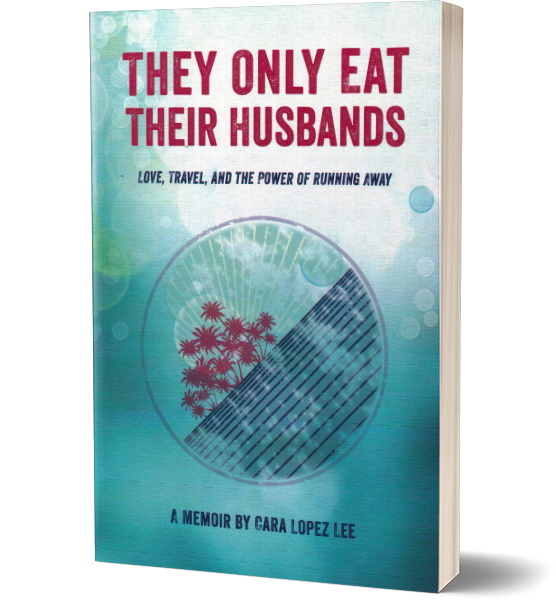Around noon, an aging sedan rolled up. A skinny, baby-eyed girl-woman got out, stepped up to the courtyard gate, and gave me a puzzled smile through the bars. She had long, metallic-red hair, mod side-bangs, and fluffy white ankle boots.
“Sara?” I asked.
She widened her eyes, as if shocked at the very thought. “Anita.”
“Un momento.” I rushed toward the house to find someone to unlock the gate.

Once-upon-a-time, with Americans crossing the border to shop for novelties and bargains, Juárez used to be a great place for entrepreneurs.
Anita is Sara’s daughter, a twenty-year-old student at the University of Ciudad Juárez. She had arrived to take her aunt Patricia, grandmother Carmela, and me to her mom’s house, a forty-minute drive through the gauntlet of Juárez.
We first drove through the busy old streets of el centro, or downtown. Tiny businesses crowded cheek-to-cheek sold clothes, food, electronics, repairs, and more. It seemed half the shops were vacant. El centro was starting a fast, runny, crumbly slide into decay. Patricia and Anita discussed why so many shops were boarded up or abandoned: the owners couldn’t afford monthly extortion payments to the cartels.
“It’s such a waste,” Patricia said, “since Juárez is a perfect place for a small-business person to flourish.” With Mexicans coming to Juárez to work in American and other foreign factories, and, once-upon-a-time, with Americans crossing the border to shop for novelties and bargains, it used to be a great place for entrepreneurs. Now it’s a horror. “The same thing happened in America in the 1920s,” Patricia said, comparing the cartels’ stranglehold on Juárez to the power the mobs had in Chicago and New York during Prohibition.
Anita’s oversized eyes grew rounder as the car crawled through the narrow streets. I wondered why she looked so scared. Surely this street full of people wouldn’t erupt into gunfire on a sunny Friday afternoon. Would it?
She visibly relaxed when we reached the broad Avenida 16 de Septiembre. The thoroughfare passed under the main bridge to El Paso, then changed names about four times along its extensive length. The avenue was lined with so many modern restaurants, car dealerships, big box stores, and warehouses that it felt as if we were passing through the shopping districts of multiple American suburbs. “Juárez is so big,” Patricia said. “Juárez is huge,” I echoed.
The long, sleepy drive took us to an apartment-size, two-bedroom home, huddled behind another locked gate. Patricia’s sister, Sara, greeted us with a broad smile and open arms. The friendly, chubby, unassuming woman kissed my cheek, then insisted that Carmela and I rest on the couch, while her seven-year-old daughter Sylvia and little cousin Eladio played underfoot. Sara and Patricia refused my offer to help prepare lunch, and I didn’t insist, because the kitchen was so tiny that the two sisters kept running into each other. Two couches and a dining table lined a shotgun room where I had to uncross my legs to let people pass, and the table had to be pulled away from the wall so we could eat together. Even then, we ate in shifts, because Patricia’s brother David and a friend joined us, making nine for lunch.
Instead of the tight quarters getting on everyone’s nerves, it seemed to only increase their closeness. Chatter and laughter warmed every nook and cranny. I’d spent plenty of time over the years with my own Mexican cousins from large Catholic families, so the chaos felt more or less normal.
Sara was very attentive to all of us, but grew shy at any hint of attention to her. Still, when I praised her fantastic pork chile colorado, she confided with a chef’s pride the secret to her tangy red sauce: orange juice. For dessert she’d baked a moist carrot cake balanced with a light, pleasing coconut frosting.
My greatest pleasure was watching and listening to the two children, maybe because this required only rudimentary Spanish. Like her mother, the beribboned Sylvia was smiling and quiet, though not too shy to show off her swimming awards. Eladio recited his long list of physical injuries, real and imagined. The real one was a bruise under his eye, which he insisted Sylvia had given him. Everyone laughed at this fib. They’d seen what had really happened, though I couldn’t understand what that was. No one seemed to mind when Eladio bounced a tiny ball in the house, so I bounced it back to him. He missed and it bonked him on the nose, sending everyone into gales of laughter – another injury for his list. Though the kids played hide-and-seek and giggled like kids everywhere, when it was time to go they seemed exceptionally disposed to hug and kiss the new person in their midst.
Toward evening, Anita’s and Sylvia’s dad stopped by for an hour to cuddle and talk with his daughters. Patricia explained that he doesn’t live with them, though he and Sara are not divorced.
As the sun lowered outside, Sara asked me, “Are you scared to be in Juárez?” I said that I’d traveled to dangerous places before and that I tried not to dwell on it. I explained that I felt safe with Patricia and her family, since I trusted my friend not to take me anyplace too dangerous. At this, I shot Patricia a warning glance, making everyone laugh again.
Sara drove us back to Carmela’s house at twilight, and her daughters came along. When we arrived it was seven o’clock and night was falling. I wondered why they risked driving after dark in this city under siege.
Maybe fear becomes so exhausting after a while that it turns into a giggling nervousness, or foolish fearlessness, or numbness through which an inner voice occasionally calls out: “Hey! You could die any moment!” Does everyone answer that voice the same way I do? “Yes, but I have a feeling it won’t be today.”
(The names of the people in this story have been changed for their safety.)




